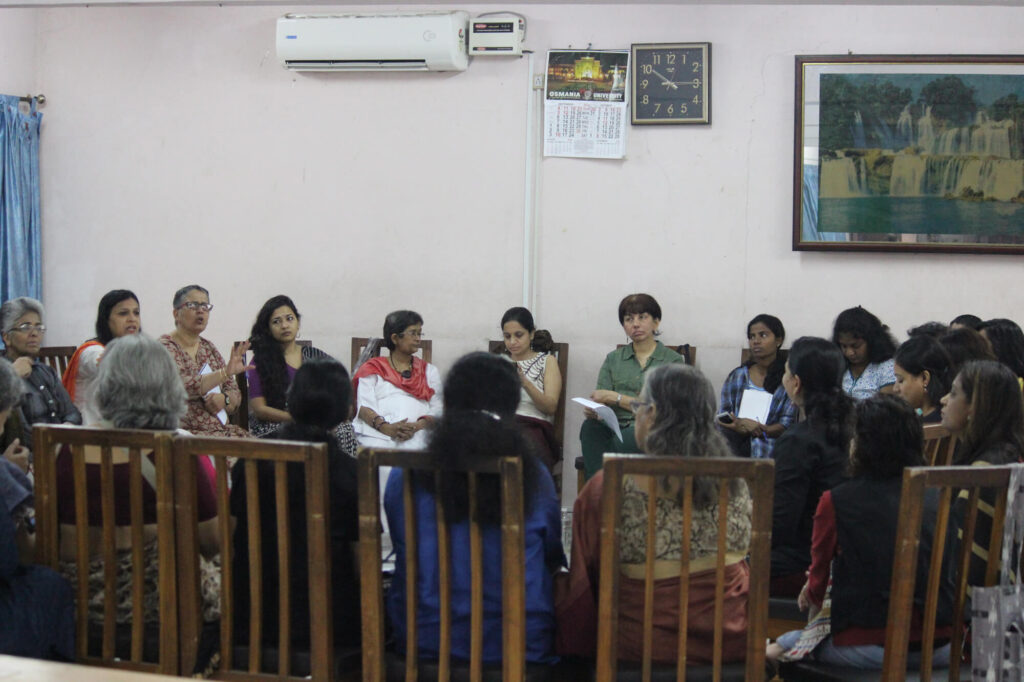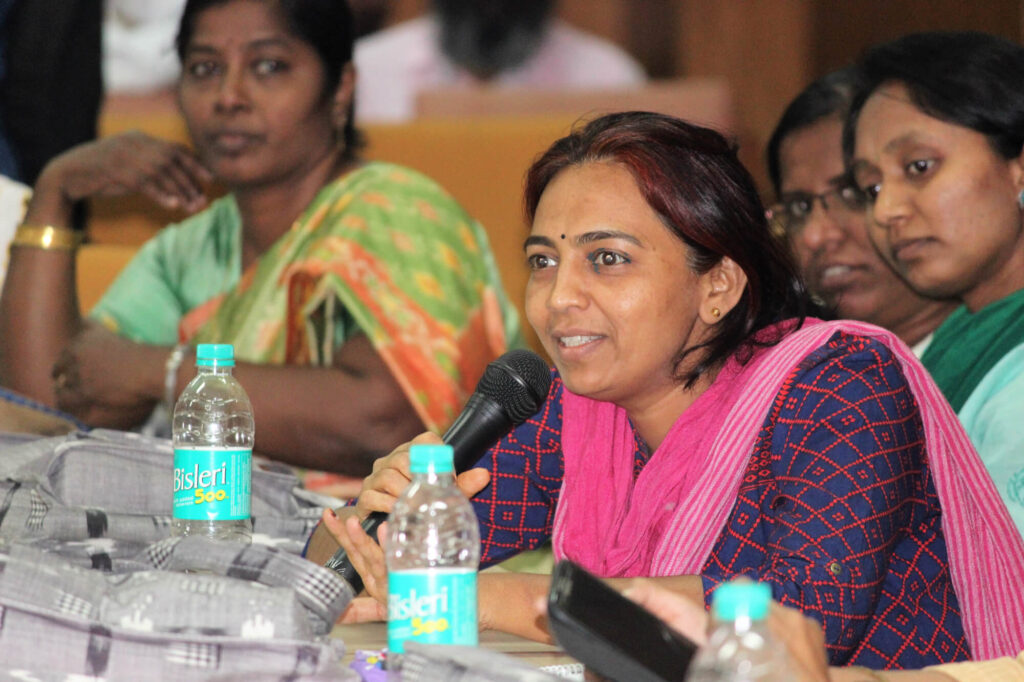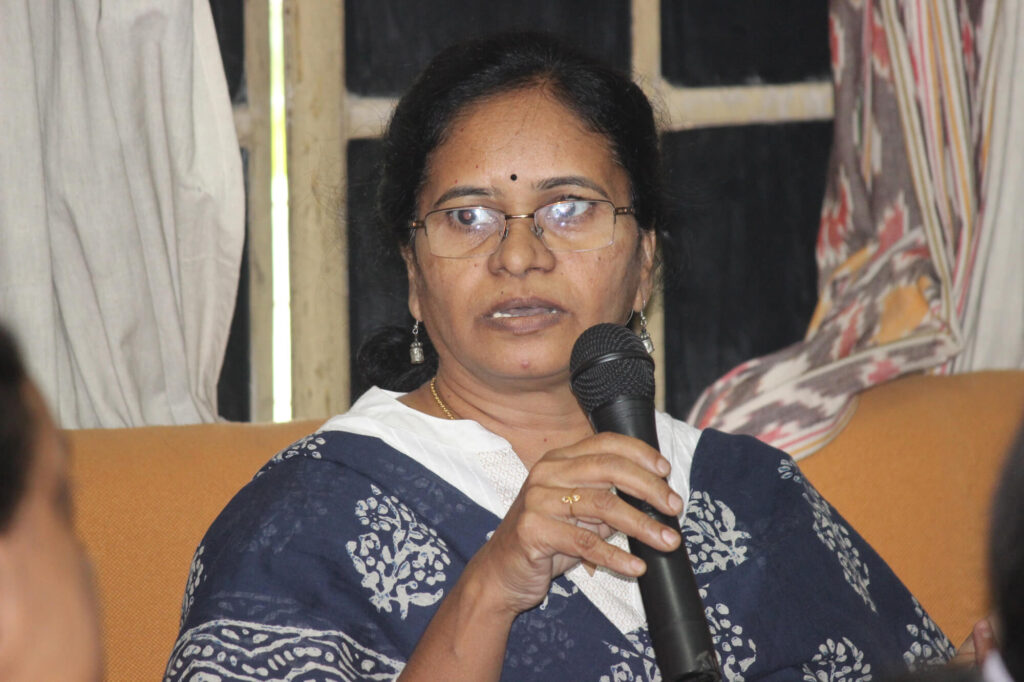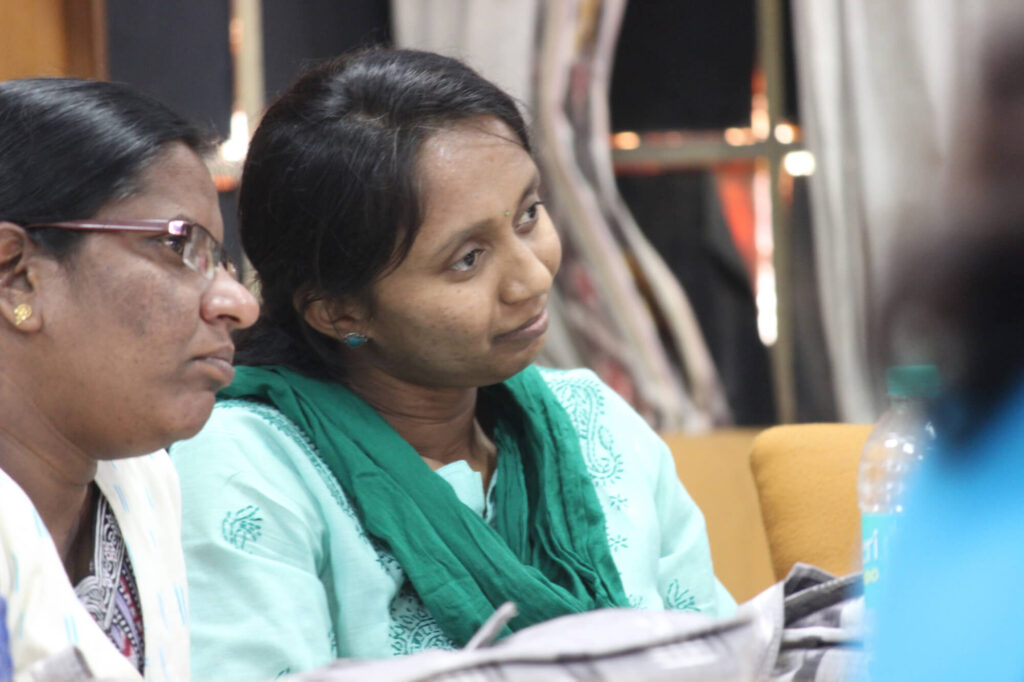Network sessions
Sessions for internal discussions among members of the NWMI took place over breakfast on Saturday and Sunday, as well as on Sunday afternoon.

Saturday, 12 November, 8-9.30 am | Network Meeting over breakfast
Strengthening Independent Journalism
Since the NWMI has a large number of independent (freelance) journalists as members, issues specific to their work have long been at the forefront of its concerns. It was at the 2014 meeting in Ahmedabad that issues facing freelancers began to be drawn together more systematically, with Neha Dixit, Raksha Kumar and Rohini Mohan taking the lead in collating a database of publications, editors, payment rates and conditions, and even some remarks on the general trend of payment timelines. Since this resource has proved to be so valuable, a network session was held over breakfast on the second day of the meeting in Hyderabad to take the discussion forward.
Providing an update of the database, which now contains information from 127 organisations and individuals, Neha and Rohini pointed out that the list of editors and commissioning editors needs to be updated as some people have moved on from their organisations and similar details about regional language media are still missing since contributions have not come in (they pointed out that this is important and could be helpful for both English and regional language journalists). They also said there are too few names of editors on the list and it would help to include more, especially those of women editors in various organisations.
The main challenges for independent journalists are:
- No paperwork or legal documents to hold media houses accountable, especially in case of late/delayed payment
- Ideas reportedly rejected but actually stolen to be worked on by staff and appear in print a few months later
- No provision for kill fee (part payment for commissioned stories that are not published for various reasons)
- No reimbursement for travel and accommodation while news gathering
- Lack of a support structure and accountability of media houses in the event of cases filed against reporters for stories
Various ways of putting pressure on media houses to be just and fair towards independent journalists were discussed. One suggestion was to start a weekly online ‘warning and whispers’ to caution freelancers while also naming and shaming erring publications. However, some felt that such a move could boomerang, with repercussions such as payments being withheld, future work denied, and so on. One member confirmed that while she was paid after 14 months after having used NWMI’s support to pressurise a particular publication, it was clear that she could never write for them again. Another suggestion was that, in lieu of a public weekly bulletin, the remarks section in the existing database can be used to post warnings based on experience. This gives a heads up to any journalist planning to write for the publication that payments are likely to be delayed, if not denied.
Another important issue that came up was the question of how to talk about money. It was generally felt that women often don’t like to talk about money, but they need to. Taking the direct approach was found to work best. For example, it is important to keep asking for an advance and, in fact, embarrass editors by being direct and detailed about expenses, even if advances are seldom provided. It was suggested that it was advisable to have this conversation right at the beginning of a discussion about an assignment.
The fundamental thrust should be to inculcate a culture of respect for the independent journalist who has pitched a story idea or already done a story, at the very least letting them know about rejection quickly so they can pitch elsewhere and, of course, not stealing ideas. Recognising that not everyone may be familiar with the relatively recent practice of formally pitching stories to editors, it was felt that it would be helpful to develop and share a sample pitch that could be used as a prototype.
There was concern about the fact that many freelancers distort the market by offering to write for free. Often, the sub-text of the editor’s message is: “We don’t have a big budget but we will give you visibility.” The example of 101 Reporters, a Bangalore-based network, was shared. They reach out to reporters across the country, give them basic training and negotiate a rate of Rs 5 per word for them. 101 Reporters takes a cut and gets credit at the end of the report. Of course they run the risk of those reporters eventually approaching editors directly, but the system appears to be working for now.
Another concern was that editors could perceive some journalists as good but tough to deal with because they “negotiate” a lot. Negotiation at the collective, rather than individual, level could circumvent such labelling, it was felt.
A suggestion to improve connection and communication between journalists and editors was to create a list of independent reporters, with details such as areas of specialisation (if any), language competencies, etc., and samples of recent work– so that editors can find and approach suitable reporters for particular stories. Some members volunteered to start compiling such a directory, which would include not just metro-based, English language journalists, but also those based in different parts of the country and working in different languages.
The idea of a Charter for Independent Journalists – a wish list of ideal conditions to work towards – which was discussed in Ahmedabad was taken forward in Hyderabad. A link to the charter in the email signatures of independent journalists could convey the information that there is a larger community of independent journalists who are conscious of their professional rights.
The absence of official accreditation, identity/press cards for independent journalists also came up as a big issue that sometimes hampers effective reporting by freelancers and was seen as an area that needs to be further explored.
Sunday, 13 November, 2-3.30 pm
Issues concerning regional language media
Since women journalists in the regional language media face additional, immense problems which are rarely highlighted, it was decided to schedule a special session to focus on these issues. Several concerns emerged during the session.
Rama Saraswati summed up the situation of the Telugu press, which still has very few women, saying they cannot do what they want, only what they are told. According to her, they are akin to clerks, not really journalists. Women are generally given only the features desk, not the political beat. They cannot report from the field. Even if we want to interview someone, she said, the editor will give us a list of questions. The designations are lowly and unchanging – she has been a sub-editor for ten years. Sexual harassment is rampant. There are complaints cells, but even the women on the committees tell us to ignore the problem and get on with work, and do not address the issue at all.

Padmasri from the Hyderabad chapter said that while she chose journalism over a government job, she soon learned that there was no scope for freelancing in the regional language media. She started her freelancing career as a contributor from Nizamabad district while studying in college. She worked hard, and wrote good stories on the Naxalite movement, and human interest stories about migrants, caste panchayats, etc. One of the major issues here was non-payment for her work. She eventually moved to fulltime work in Eenadu where she has been since. She said that initially the women’s page focused on serious issues, avoiding the more stereotyped topics of food and fashion, and she got to interview hundreds of important figures in the movement. However, at the turn of the century a shift took place across the media, including the state media, and there is no longer scope for investigation and analysis. Interviews are preferred of youth and celebrities, and there are no serious stories. So while there is much technical development in the media, there is no job satisfaction, no journalism at all. For the last seven years she is at the digital desk, “breaking my head with breaking news”. This situation inspired her to attend the national meet which she left inspired by the interactions and discussions with colleagues from all over the country.

According to Manjula, “We have a committee to deal with sexual harassment, but their actions lead to more insecurity for the women staff.” Here, too, the notion is that women should adjust and tolerate sexual harassment, which is just part of the job.
Kavitha Katta, who has been in the Telugu media for 12 years, still draws a pittance as salary. As a Dalit journalist who moved from print to electronic media, she has faced the humiliation of juniors getting the same salary as her, sometimes even more, simply because of their caste. Being a Dalit and a woman makes it difficult to be a journalist, she said: Whether it is cultivating sources over a drink or being ‘one of the boys’, a Dalit woman always risks character assassination.

Delhi-based Divya Arya said, “As a bilingual journalist who reports for the BBC in English for worldwide audiences and in Hindi for a domestic B-town non-metro audience, I think forums get dominated by English-language journalists and there is an urgent need for journalists in vernacular languages to speak up.” She added that Hindi journalism in general also faces issues of low salaries and harassment for employees of any gender. She shared that across the BBC there is a move to understand how content can be made gender-sensitive in order to attract more women as consumers of news and that should pave the way for a different news agenda and, indeed, even reportage.
Shobhana from Chennai thanked seniors like Kavitha and Kavin for paving the way for younger women like her in the Tamil media. Women journalists are easy game, and one has to watch what one says and does, since it is easy to get stuck with a label, she said.
Talking about the scene in Marathi news, Manaswini Prabhune said that the harassment was not as bad, since the situation had somewhat changed over the past five or six years. There are more channels, and more women are getting into electronic media. But the political beat continues to be out of bounds for women. In fact, because of the shaming and mud-slinging to which female reporters are often subjected, many women prefer to stay on the desk. Salaries continue to be low.
Megha Shimpi said there is little encouragement for professional growth: “When I released a book on street children, I was criticised for not doing my job, even though I had worked on it in my off-time.”
Sandhya Taksale touched upon the abysmal situation of freelancers in the Marathi press. When the payment is low and even that takes a long time to come, there is no question of getting any reimbursement for travelling or other expenses. In the regional media, the deep-rooted gender bias ensures that freelancing is considered just a hobby or pastime, not a serious professional option, she pointed out.
Sharing her experience of moving from Marathi to English media, Kaumudi Gurjar spoke about how women journalists are not treated on par with male colleagues. “I was not given an appraisal in Sakal, the Marathi daily I worked for, on the ground that I came from an affluent family and did not need the salary to run my family,” she revealed. When she moved to Mid Day, it was a great opportunity for professional growth as she was given the crime beat and covered major events like the German Bakery blasts and riots.
Chithra from Kerala spoke of the disregard for photojournalism, when photos were not considered work to be paid for. If photographers refused to give their photos for no payment, the article was used with photos lifted from the internet.
In conclusion, Rajashri said that it was a pity that the same issues should continue to plague women journalists decade after decade. The good news was that they are now speaking up, demanding their rights and making their voices heard.


